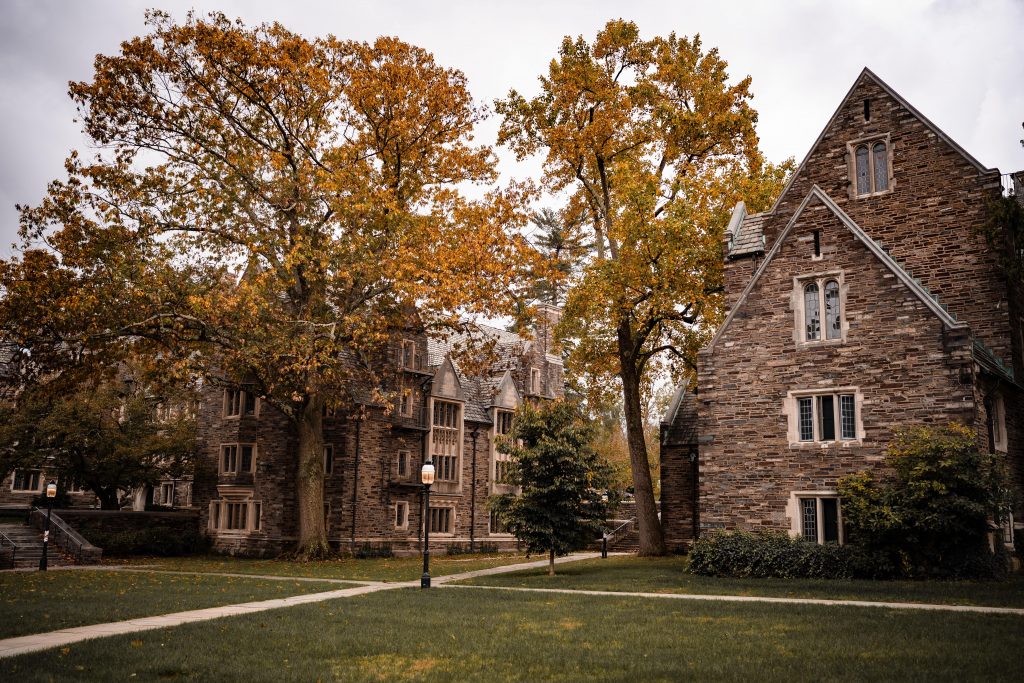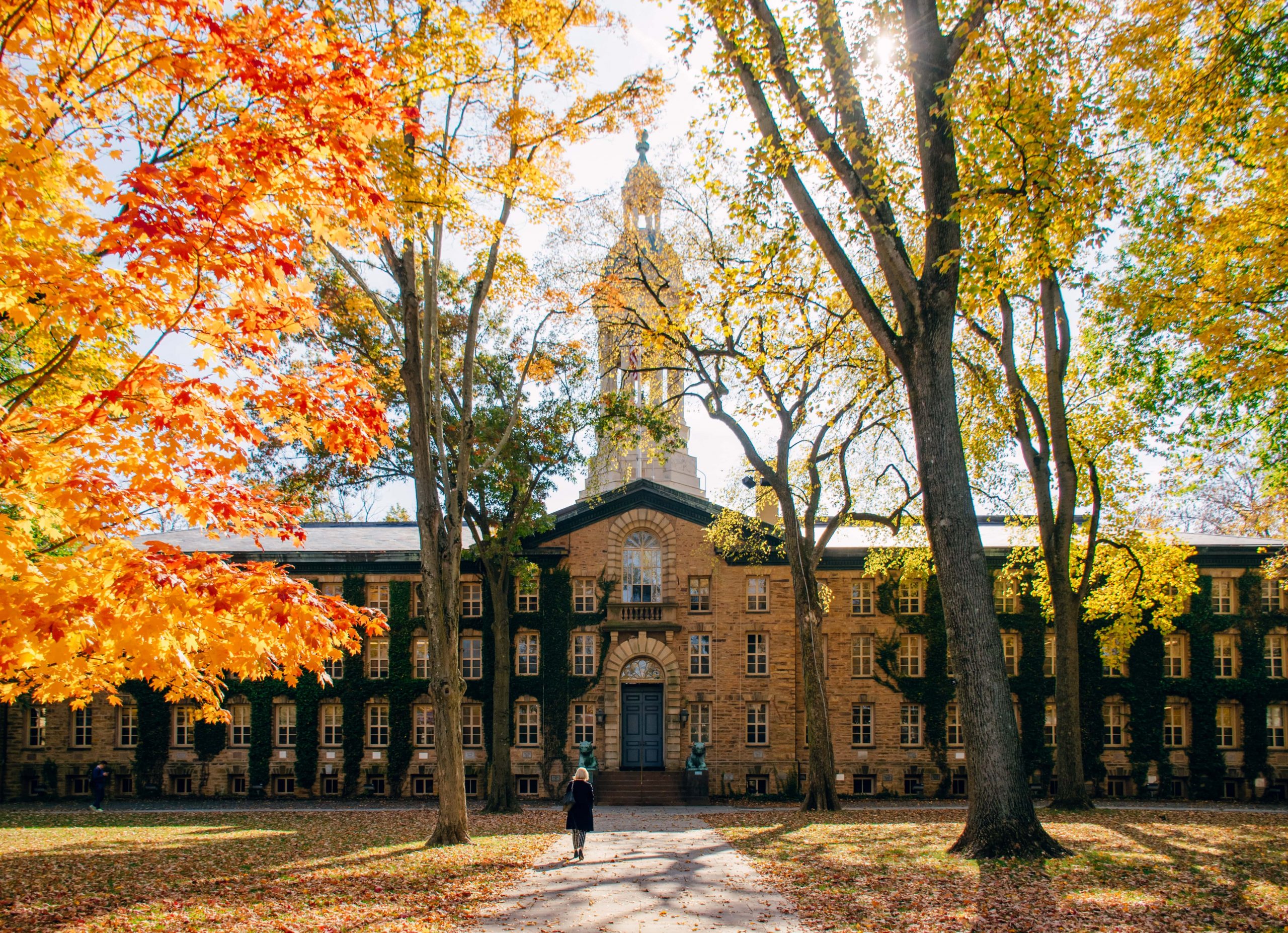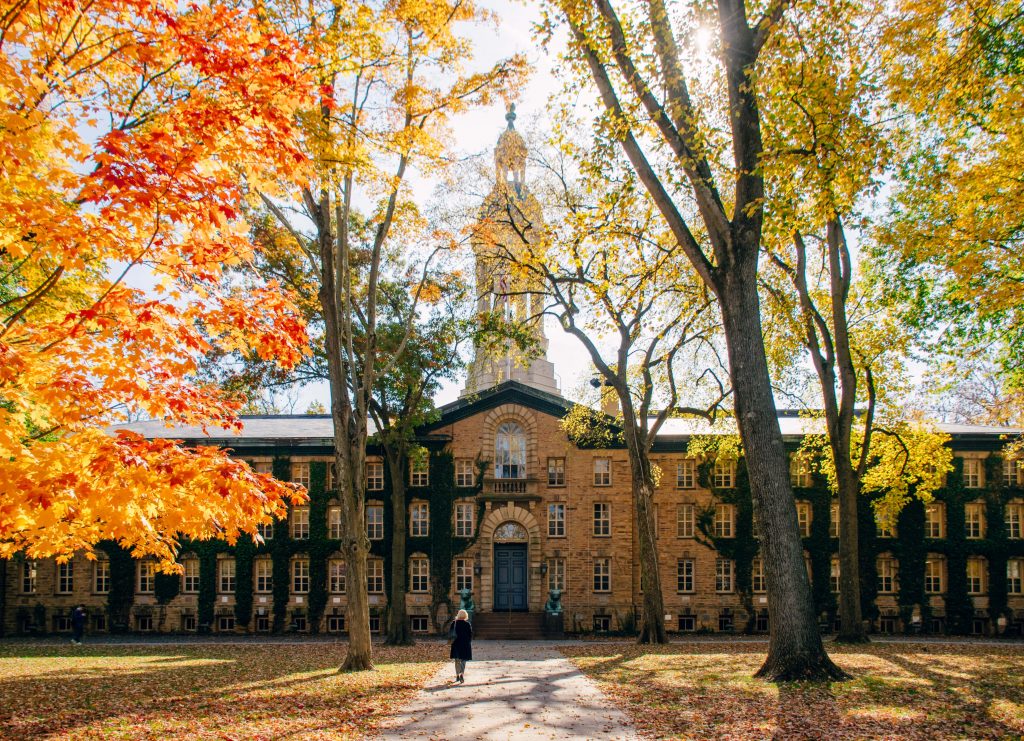Table of Contents
TogglePrinceton University, located in Princeton, New Jersey, is a private Ivy League research university that has been in operation since 1746, making it one of the oldest universities in the United States. The university is well-known for its excellent academics, distinguished faculty, and beautiful campus setting. This blog will detail everything you need to know about Princeton University admissions, the courses available, rankings, benefits, and more!
Undeniably, Princeton University has a long list of notable alumni across various fields. Here are just a few examples:
- Michelle Obama
- Jeff Bezos
- John F. Kennedy
- F. Scott Fitzgerald
- Meg Whitman
Princeton University admissions offer a wide range of courses across various disciplines, and many of them are popular among students. Here are some of the most popular beginner courses at Princeton University:
- COS 126: Computer Science: An Introduction – This is an introductory course in computer science, which is required for many majors at Princeton.
- ECO 100: Introduction to Microeconomics – This is an introductory course in microeconomics, which is required for many majors at Princeton.
- HIS 226: Modern American History – This course explores the history of the United States from the Civil War to the present day.
- MAT 103: Calculus I – This is an introductory course in calculus, which is required for many majors at Princeton.
- ORF 245: Financial Markets – This course covers the theory and practice of financial markets, including stocks, bonds, and derivatives.
- PHY 103: General Physics I – This is an introductory course in physics, which is required for many majors at Princeton.
- POL 345: American Constitutional Law – This course explores the principles and practices of American constitutional law.
- PSY 101: Introduction to Psychology – This is an introductory course in psychology, which is required for many majors at Princeton.
- REL 205: Introduction to the Hebrew Bible/Old Testament – This course explores the Hebrew Bible/Old Testament from a historical and literary perspective.
- SPA 107: Intermediate Spanish – This course is designed for students who have already completed an introductory course in Spanish and want to further develop their language skills.
It should be noted that this is only a small selection of the courses offered at Princeton University; depending on the student’s interests and majors, many other courses may prove to be more popular.
Acceptance Rate At Princeton University
]Princeton University’s admission process is extremely selective, with an acceptance rate of only 3.8%. The university received 37,601 applications for the Class of 2025 and admitted only 1,647 students, with 1,345 eventually enrolling. Princeton has a sizable international student body, with 635 undergraduates from other countries accounting for more than 20% of the total student body.
An ACT score of 33 to 35 or an SAT score between 1460 and 1570 is required for admission to Princeton University for half of the applicants.
How Is The Campus Life?

The Princeton University campus stretches over 500 acres and is home to a variety of historic and contemporary structures, including the well-known Nassau Hall, which was constructed in 1756. Along with residence halls, dining establishments, libraries, gyms, and other on-campus amenities, the campus also has a student centre.
Students at Princeton University have access to a host of top-notch facilities, such as:
- The Princeton University Library: One of the largest university libraries in the world, providing access to millions of print and electronic resources.
- The Lewis Center for the Arts: A state-of-the-art facility for visual, literary, and performing arts.
- The Princeton University Art Museum: Houses an extensive collection of over 100,000 works of art from around the world.
- The Princeton Plasma Physics Laboratory: A cutting-edge research facility that investigates fusion energy.
- The Princeton Neuroscience Institute: Conducts research in neuroscience, including the study of brain development, perception, and behaviour.
- The Princeton Environmental Institute: Focuses on environmental research and education, including climate science, sustainability, and ecology.
- The Carl A. Fields Center: Provides resources and support for students from diverse backgrounds, including counselling, mentoring, and academic programs.
- The University Health Services: Offers comprehensive health care services, including medical care, mental health counselling, and wellness programs.
- The Dillon Gymnasium: Provides a wide range of fitness equipment, classes, and recreational sports programs.
Scholarship Programmes
Princeton University admissions have a number of scholarship programmes to assist students in funding their education. Here are some of Princeton University’s scholarship programmes:
- Need-Based Financial Aid: Princeton is committed to making its education affordable to all students, regardless of their financial circumstances. The university provides generous need-based financial aid to eligible students, covering the full cost of tuition, room, board, and other expenses.
- Merit-Based Scholarships: Princeton also offers merit-based scholarships to outstanding students who demonstrate exceptional academic and extracurricular achievements. These scholarships are highly competitive and typically cover a portion of the student’s tuition and other expenses.
- Fellowship Programs: Princeton offers several fellowship programs that provide financial support to graduate students and postdoctoral scholars pursuing research in various fields. These fellowships cover tuition, stipend, and other expenses.
- External Scholarships: Princeton encourages its students to apply for external scholarships, such as the Rhodes, Marshall, and Fulbright scholarships. The university provides support and resources to help students navigate the application process and increase their chances of success.
Overall, Princeton University admissions provide a variety of scholarship programmes to help students achieve their academic and professional objectives. Eligibility and application requirements may differ depending on the programme, so interested students should visit the university’s financial aid website for more information.
The Princeton University Admission Process
Princeton University’s admissions process is highly selective and competitive, with several steps. The following are the specifics of the admissions process:
- Application: Applicants must complete either the Common Application or Coalition Application, including all required forms and essays. The application also requires an application fee, which can be waived for eligible students.
- Standardised Tests: Applicants are required to submit scores from either the SAT or ACT, as well as two SAT Subject Tests. Princeton also offers a test-optional policy for the 2022-2023 application cycle, allowing students to choose whether to submit standardised test scores.
- Academic Transcripts: Applicants must submit official transcripts from all high schools and colleges attended.
- Letters of Recommendation: Applicants must submit two teacher evaluations and one counsellor recommendation, which should provide insight into the student’s academic abilities, character, and potential.
- Optional Arts Portfolio: Applicants who have exceptional talent in the visual or performing arts may submit an optional art portfolio for consideration.
- Interviews: Princeton offers optional interviews to applicants who have completed their application, but they are not required.
- Financial Aid: Princeton provides need-based financial aid to eligible students. Applicants are required to submit the CSS Profile, the FAFSA, and any additional documents required by Princeton’s Office of Financial Aid.
Regular decision applicants typically have an application deadline of January 1st, and admission decisions are released in late March. The deadline for early decision applications is November 1st, and decisions are released in mid-December.
International applicants have different eligibility requirements than US applicants, particularly if they come from non-English-speaking countries. The eligibility requirements for undergraduate and graduate levels are as follows:
Undergraduate Level:
- Completion of Grade 12 in a relevant discipline
- Required English language proficiency through TOEFL, IELTS Academic, or PTE Academic exams
Graduate Level:
- Completion of a 3-4 year bachelor’s degree in a relevant discipline
- Required English language proficiency through TOEFL or IELTS exams
- Required GMAT or GRE scores
Overall, Princeton University’s admissions process is rigorous and competitive, but the university strives to enrol a diverse and talented student body. Eligibility requirements and application details may vary, so prospective students should consult Princeton’s admissions website for the most up-to-date information.

Why Consider Princeton University?
- Rankings
Princeton University, founded over 250 years ago, is a world-class research university in Princeton, New Jersey, USA. Princeton, a private Ivy League university, has earned a reputation for its dedication to research and teaching excellence. In fact, the university outperforms many of its Ivy League peers in terms of research citations per faculty member. Princeton is consistently ranked among the top 100 universities in the world by various influential publications, solidifying its position as one of the world’s leading academic institutions.
- ARWU (Shanghai Ranking) – Universities Rankings (2022) – 6
- QS – World University Ranking (2022) – 20
- QS – World University Ranking (2023) – 16
- THE (Times Higher Education) – University Ranking (2022) – 7
- THE (Times Higher Education) – University Ranking (2023) – 7
- US News & World Report – Global Universities (2022) – 16
- US News & World Report – Global Universities (2023) – 16
- US News & World Report – National University Ranking (2022) – 1
- US News & World Report – National University Ranking (2023) – 1
- Placements
Princeton University admissions always yield good results. For example, the class of 2021 had a strong record for job placement, with 95% of graduates securing employment, significantly higher than the national average of 68%. These graduates were hired by more than 500 employers across a variety of industries, including business, science & technology, health, engineering, social services, and law, and they were paid an average salary of USD 90,700. Additionally, Princeton provides internship opportunities for enrolled students and has kept a 100% internship rate through 2021.
The most recent placement highlights from Princeton University are as follows:
- Graduate Outcomes Rate – 95%
- Total Students Graduated – 986
- Average Salary – USD 90,700
- Employed Full time – 730 students
- Highest Industry Wise Hires – Business: 292 students
- Total Employers – 500+
- Highest Employment Location Wise – New York: 264
Princeton University is a highly regarded Ivy League institution that distinguishes itself from other universities in several ways. The university’s emphasis on undergraduate education and personalised attention from faculty members is attractive to students seeking a more intimate academic experience. Additionally, Princeton’s strong research reputation and renowned faculty members make it an ideal destination for those interested in pursuing graduate studies. The university’s location in a picturesque town in New Jersey with a stunning campus is another draw for prospective students. Finally, Princeton’s strong placement record, with a high employment rate and competitive salaries for graduates, makes it an attractive option for those seeking career opportunities after graduation.
Thank you for reading this blog on ‘Princeton University Admissions: A Quick Overview’. If you’d like to read more blogs, here are some recommendations that may interest you –


















1 thought on “Top PGDM Courses In Canada: Universities & Eligibility”
I have done Bachelor’s in Culinary Arts from India and completed my graduation in the year 2022 .I am 22 years old. After graduation, I have done 1 year paid internship from USA .Now, I would like to take occupational experience and learn culinary skills and also do masters in Culinary arts.How can I find the college n best course / country where I can persue studying further